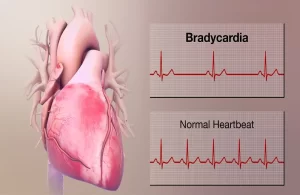1.5K
Introduction to Normal Heart Rate
Heart rate, also known as pulse rate, refers to the number of times a person’s heart beats per minute (bpm). It is an important physiological parameter that reflects the overall health and fitness of an individual. The normal range of heart rate varies depending on various factors such as age, sex, physical activity level, and underlying medical conditions. heart health
In adults, the normal resting heart rate ranges between 60 and 100 bpm. However, athletes or individuals who regularly engage in physical activity may have a lower resting heart rate of 40 to 60 bpm, as their hearts are more efficient in pumping blood. Children and infants have a higher resting heart rate, with newborns having a range of 100 to 160 bpm, which gradually decreases with age.
The heart rate is regulated by the autonomic nervous system, which consists of two branches: the sympathetic and parasympathetic nervous systems. The sympathetic nervous system is responsible for increasing heart rate, while the parasympathetic nervous system decreases it. This balance between the two systems is essential to maintain a normal heart rate.
Monitoring heart rate is an important tool for diagnosing various medical conditions such as arrhythmias, heart failure, and hypertension. It can also be used to evaluate the effectiveness of medications and treatments for cardiovascular diseases.
In conclusion, a normal heart rate is a key indicator of overall health and fitness. It is important to monitor your heart rate regularly to ensure it stays within the normal range for your age and physical activity level. Any significant changes in heart rate should be promptly reported to a healthcare professional for further evaluation and treatment.
 Tips for Maintaining Heart Health :
Tips for Maintaining Heart Health :
The heart is a vital organ that is responsible for pumping blood throughout the body. Maintaining heart health is essential to overall health and wellbeing. Here are some tips to help keep your heart healthy:
-
Eat a Healthy Diet: A heart-healthy diet should include plenty of fruits, vegetables, whole grains, lean proteins, and healthy fats such as olive oil and nuts. Avoid processed foods, high-fat meats, and foods high in sodium and sugar.
-
Exercise Regularly: Regular physical activity can help improve heart health by strengthening the heart muscle, lowering blood pressure, and reducing the risk of heart disease. Aim for at least 150 minutes of moderate-intensity exercise or 75 minutes of vigorous-intensity exercise per week.
-
Maintain a Healthy Weight: Excess weight can put extra strain on the heart and increase the risk of heart disease. Maintaining a healthy weight through a balanced diet and regular exercise can help reduce this risk.
-
Manage Stress: Chronic stress can increase the risk of heart disease by raising blood pressure and increasing inflammation in the body. Practicing stress-reducing techniques such as meditation, yoga, or deep breathing can help improve heart health.
-
Quit Smoking: Smoking is a major risk factor for heart disease. Quitting smoking can help reduce this risk and improve overall heart health.
-
Limit Alcohol Intake: Excessive alcohol consumption can increase blood pressure and the risk of heart disease. Limiting alcohol intake to moderate levels (up to one drink per day for women and up to two drinks per day for men) can help maintain heart health.
-
Get Regular Health Check-Ups: Regular check-ups with a healthcare professional can help identify and manage risk factors for heart disease such as high blood pressure, high cholesterol, and diabetes.
In conclusion, maintaining heart health requires a combination of healthy lifestyle habits and regular medical care. By following these tips, you can help reduce your risk of heart disease and improve overall heart health.
Conclusion
In conclusion, heart health is vital to overall health and wellbeing. A healthy diet, regular physical activity, stress management, and avoiding harmful habits such as smoking and excessive alcohol consumption are all important steps to maintaining heart health. Regular medical check-ups and managing risk factors such as high blood pressure, high cholesterol, and diabetes are also essential. By making lifestyle changes and seeking appropriate medical care, individuals can reduce their risk of heart disease and improve their overall heart health. It is never too late to start taking care of your heart, so make heart health a priority today.
sources for information on maintaining heart health:
American Heart Association
National Institutes of Health
Mayo Clinic
